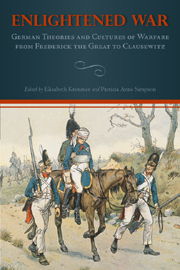Book contents
- Frontmatter
- Contents
- List of Illustrations
- Acknowledgments
- Introduction: Enlightened Warfare in Eighteenth-Century Germany
- Part I War and Enlightenment
- Part II Cultures of War in Classicism and Romanticism
- 3 Agamemnon on the Battlefield of Leipzig: Wilhelm von Humboldt on Ancient Warriors, Modern Heroes, and Bildung through War
- 4 War, Anecdotes, and the Backsides of Reason: Kleist with Kant
- 5 “Schon wieder Krieg! Der Kluge hörts nicht gern”: Goethe, Warfare, and Faust II
- 6 Recoding the Ethics of War in Grimms' Fairy Tales
- Part III War and Gender
- Part IV War and Theory
- Bibliography
- Notes on the Contributors
- Index
5 - “Schon wieder Krieg! Der Kluge hörts nicht gern”: Goethe, Warfare, and Faust II
from Part II - Cultures of War in Classicism and Romanticism
Published online by Cambridge University Press: 05 February 2013
- Frontmatter
- Contents
- List of Illustrations
- Acknowledgments
- Introduction: Enlightened Warfare in Eighteenth-Century Germany
- Part I War and Enlightenment
- Part II Cultures of War in Classicism and Romanticism
- 3 Agamemnon on the Battlefield of Leipzig: Wilhelm von Humboldt on Ancient Warriors, Modern Heroes, and Bildung through War
- 4 War, Anecdotes, and the Backsides of Reason: Kleist with Kant
- 5 “Schon wieder Krieg! Der Kluge hörts nicht gern”: Goethe, Warfare, and Faust II
- 6 Recoding the Ethics of War in Grimms' Fairy Tales
- Part III War and Gender
- Part IV War and Theory
- Bibliography
- Notes on the Contributors
- Index
Summary
IT IS WELL ESTABLISHED that Johann Wolfgang von Goethe (1749–1832) was no friend of war and violence. From the description of the stellar constellation during his birth in Dichtung und Wahrheit (Poetry and Truth, 1811–33), where Mars looks on indifferently — “Saturn und Mars verhielten sich gleichgültig” (Saturn and Mars remained indifferent) — to his unwillingness to accompany Duke Carl August of Weimar on the campaign in France, Goethe sought to remain at a distance from war. Numerous references in his works and letters as well as statements recorded by his secretary, Johann Peter Eckermann (1792–1854), affirm this aversion. For example, in a letter to Johann Friedrich Rochlitz (1769–1842) from 22 April 1822, Goethe called war “diese Erbkrankheit der Welt” (this hereditary disease of the world). In a conversation with Eckermann on 27 April 1825, he proclaimed his hatred of all forms of violence: “jedes Gewaltsame, Sprunghafte, ist mir in der Seele zuwider, denn es ist nicht naturgemäß” (SW, 19:519; I loathe everything violent, sudden, because it is not natural). During the Wars of Liberation, Goethe belonged to a minority of writers who did not share the national fervor; consequently, he did not support the war effort through literary production: “Bei mir aber, der ich keine kriegerische Natur bin und keinen kriegerischen Sinn habe, würden Kriegslieder eine Maske gewesen sein, die mir sehr schlecht zu Gesicht gestanden hätte” (SW, 19:660; But in my case, since I am not a natural warrior and do not have a martial outlook, war songs would have been a mask that would not have suited me at all).
- Type
- Chapter
- Information
- Enlightened WarGerman Theories and Cultures of Warfare from Frederick the Great to Clausewitz, pp. 126 - 150Publisher: Boydell & BrewerPrint publication year: 2011

